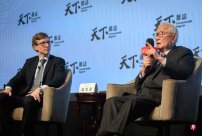The AC -iged agreement aims to weaken China's ambition to establish its own chip production capacity, and will expand some export control measures adopted in the United States last October to the Netherlands and Japanese companies.The actual implementation plan may take months.
(Washington / Feld Hoffen Comprehensive News) People familiar with the matter revealed that in the negotiations of the United States and the Netherlands and Japan at the end of Friday (January 27), they restricted an agreement on China's advanced chip manufacturing machines.
Comprehensive Bloomberg and Reuters report that the U.S. -Dutch agreement aims to weaken China's ambition to establish its own chip production capacity.ASML Holding NV, Nikon Corp, a large optical instrument manufacturer in Japan, and Tokyo Electron LTD, a giant of semiconductor manufacturing equipment.
The export control measures in the United States last October stipulated that it was prohibited to provide China with cutting -edge semiconductor chips used to use American technology.
After the implementation of the new regulations, the Netherlands will ban Asto from selling extremely ultraviolet light machines to China, which is critical to manufacture cutting -edge chips.Japan will also set similar restrictions on Nikon.
People familiar with the matter said that the official has not announced plans to reach an agreement on the US and Daily.Since the Dutch and Japan still have to finalize their final legal arrangements, the actual implementation plan may take months.
This talks is non -public, and the theme also includes the safety of protecting emerging technologies.
The White House, the Dutch Ministry of Foreign Affairs, and the Ministry of Economic and Industry of Japan have all reached an agreement to comment.Nikon and Tokyo Electronics did not respond to this.However, Thierry Breton, the European Executive Committee's internal market, said on Friday, Washington that he fully agreed to deprive China's strategy to obtain the most advanced chip.
The Dutch Prime Minister Lutter said in Hague on Friday that the new semiconductor export limit is a "sensitive subject", which has been negotiated with the United States for a long time.Essence
The new agreement is a major diplomatic victory for US President Biden.However, Ace Wennink, CEO, reminded Wednesday (January 25) that the US export control measures may promote China's successful development of advanced chip manufacturing technology.He said that if China cannot buy related equipment, they will develop and develop themselves.
Analysts of the British Communication Research Company OMDIA believe that according to the new regulations, Japanese companies can still sell non -cutting products to China, and the decline in exports to China may be increased in the medium and long term.Exit to make up.However, if new restrictions include measures such as prohibition of dispatch engineers using Japanese equipment, it will have a great impact on Japanese corporate affairs, and the Japanese government and enterprises may oppose it.
The Japanese Liberal Democratic Party member Aoyama said that China will definitely retaliate against Japan's dominant US -led semiconductor equipment to lose China. Japanese companies will also be affected and must model a new export market.
In addition, negotiators are also worried that the introduction of new restricted facilities may also cause the global chip shortage, which will seriously interfere with the global supply chain.


